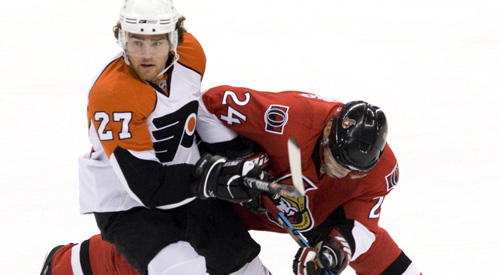
Role of the Rookie
There has long been a silent but well known code in Junior hockey.
The rookies are to do what the veterans tell them to do, no questions asked. In recent years, that so called code has been thrown out the window by new rookies who think they should gain instant respect instead of earning it.
In the past when rookies would join a team, they would respect the team’s veterans for everything they had done in the years prior. They’d do anything the vets asked them to do, whether it include picking up pucks at the end of practice, fetching Gatorade or re-filling the shampoo in the shower.
“One thing that stands out to me [in my rookie year] was the bus rides. Rookies had to load the equipment, pack the sticks, hand out the food, and sit at the front of the bus while the vets sat at the back chirping [us],” said Alex Rand, a four-year-veteran of the Niagara Junior C league. “It wasn’t a question of ‘Who’s doing it?’ It was more of a question of, ‘When will this [stuff] be done rook?’ It was all about respect and those were the unwritten rules; the code that never had to be said.”
Tyler Wilkieson, a defenceman entering his fifth year of Junior hockey, also remembers those bus trips and everything that he went through as a rookie.
“When I was [a rookie] I was as happy as a pig rolling in its own [filth],” Wilkieson stated. “I had no problem filling the water bottles, picking the pucks up after warm-up or cleaning the dressing room. I knew what my role was and I was okay with it because I knew that’s what I had to do to one day be in their position.”
[php snippet=1]
But it seems now, that the respect that the previous two players have talked about has waned.
“One time we got back from a road-trip, and one vet didn’t take the bus home and his bag needed to be unpacked,” explained another long-time veteran of the Niagara Jr. C league. “I asked a rook to do it and he said, ‘no ****ing way’ and left the dressing room. That’s when I knew it would never be the same.”
It has long been a rule in any level of hockey that what’s said and done in the locker room stays in the locker room. Every hockey player knows that. Yet this new wave of players has seemingly taken the sacred confines of a Junior hockey room and made them into a public showcase.
“I was walking to my next class and I got stopped by this girl that I had been with secretly, and she said, ‘so I hear I’m a hot-topic in the dressing room’,” said a four-year veteran of Junior hockey now playing NCAA hockey in the United States. “I later found out that she was friends with a rookie’s girlfriend. I was shocked that there were snakes on my team.”
A four-year veteran of Junior hockey who currently plays CIS hockey in Ontario tells me that after the Steve Downie and Akim Aliu incident in Windsor three years ago – where the two fought in practice regarding an off-ice hazing incident – teams could not pass on the tradition that they received and it actually served to harm them in the end.
“This made the rookies fear crossing vets and therefore it was easier to establish a power difference within the team,” he said. “This tradition could be argued to be the most fundamental as it gives the rookies a level of respect which can be even transferred over to the work place, as new people don’t come in a new office and expect to run the place.”
But still, on the ice, the rookies have to earn their respect at any level of hockey. Off the ice is no different.
“As it got closer to the end of the year they didn’t think they were rookies anymore,” said a current Junior B star. “In the end, you’re still a rookie until you show you can make the squad again the next year.”
When you’re a member of a team, you have the common goal of wanting to win a championship. Most players will do anything for one another and that comes through the respect they have earned over the years. But when first-year players aren’t willing to earn the respect and think that they deserve it just for making the team, it takes away from the camaraderie.
“[All of the vets] are willing to die out there on the ice for one another and then you have the rookies in the room talking about what they wrote on each other’s Facebook walls going into a playoff game,” complained a five-year-veteran, whose team was eliminated in the first round for the fourth straight year. “Not a game or practice went by that I didn’t want to throttle one of those mouthy, spoiled, no good rookies we had. They all thought they were better than everyone and it was all about who had the most individual goals.”
However, when I asked another three-year Junior C veteran what he thought of the situation, he told me that, though he had seen these types of rookies in the past, this year his team didn’t have any problems. His team recently won the league championship and is moving on to the All-Ontario Championship.
This goes to show that if rookies buy into the system that has been set in place many years prior, and not put themselves above the chores and roles that each and every other player has had to fulfil, a team can be successful. If not, well, good luck, you’ll need it.
[php snippet=1]

